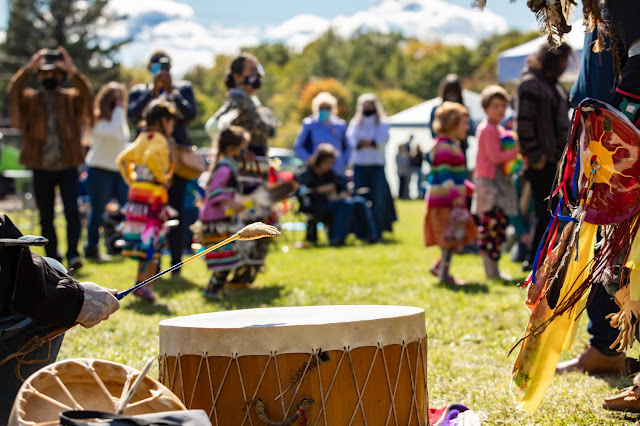By Meg Schneider, communications coordinator, National American
Indian/Alaska Native ATTC
"I have seen that in
any great undertaking it is not enough for a man to depend simply upon
himself."
- Lone Man
(Isna-la-wica), Teton Sioux
Western science has relatively recently come to understand the importance of social wellness in promoting better physical, mental, emotional, and spiritual health. Community is a foundational component of virtually every Indigenous society and has been since time immemorial. Thousands of years of experience have taught Indigenous peoples the individual and collective benefits of cultivating strong community ties.
When
the COVID-19 pandemic forced nearly universal shutdowns in March 2020, our
Native friends and colleagues told us that one of the most devastating aspects
of the health crisis was the sudden absence of in-person get-togethers.
Ceremonies, celebrations, even community meals were no longer available to
nurture and strengthen these communities, and the social hurt was almost as
damaging as the virus itself.
Indigenous communities suffered disproportionately from COVID-19: Compared with white non-Hispanic persons, they were 1.6 times more likely to contract the disease, 3 times more likely to be hospitalized, and 2.1 times more likely to die, according to the Centers for Disease Control and Prevention. When vaccines became available, American Indians and Alaska Natives had one of the highest inoculation rates in the U.S., yet COVID-related morbidity and mortality among this population continued to be higher than for other groups.
Over the past 25 years, the National American Indian and Alaska Native ATTC (first known as Prairielands ATTC, serving four Midwestern states when it launched in 1998) has adopted as a guiding principle the truth that Indigenous communities are the experts in what they need and what works for them.
Rather than dictate how they addressed the enforced isolation imposed by the pandemic, we held a series of listening sessions to find out what these communities needed and brainstormed ways we could help address those needs.
Feedback from these listening sessions led to the development of several culturally informed programs:
- Virtual Native Talking Circle: Staying Connected in Challenging Times series (with 47 sessions and counting, most recently March 13, 2023).
- Winter Living Series and Spring Living Series, focusing on cultural ways of connecting during these seasons.
- Care and Share Through Technology, which first ran weekly and eventually monthly for Tribal Opioid Response grantees and has since been expanded to all addiction, prevention, treatment, and recovery professionals serving Native populations; and
- Keeping the Fire, a three-part series on personal and collective barriers to healthier living and ways to lower those barriers.
Face-to-face gatherings are still highly preferred among our
Indigenous colleagues and communities. Adapting to technology-based
alternatives during the restrictions of the pandemic helped ease some of the
stress and grief induced by both the physical challenges of COVID-19 and the
isolation that prohibited traditional ways of connecting with others. Like Lone
Man, the staff at the National AI/AN ATTC have learned how critical
interpersonal relationships and community connections are to the success of any
undertaking, great or small.
We also have learned the importance of honoring visitors, colleagues, and those we serve.
In many Indigenous
cultures, such honoring is demonstrated via the presentation of gifts that are
meaningful in the culture from which they come. The National AI/AN ATTC staff
believe the most meaningful gifts we can offer are tools and resources to help
Indigenous communities thrive. Thus we devote many of our own resources to
developing things like the TOR Resource Guide and our monthly Essential Substance Abuse Skills (ESAS) trainings. As always, these offerings
originate from those we serve, who generously share their insights and
expertise on what they need to continue and improve the important work they do.
We are honored and grateful to be able to learn so much from the people we aim to serve. And we are eager to see what lessons the next 30 years hold.




